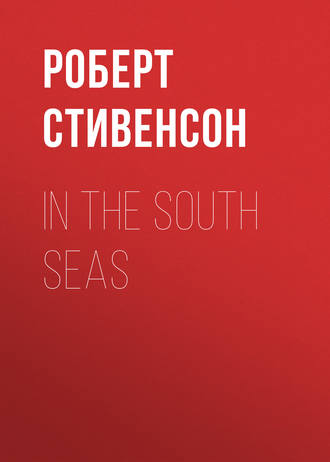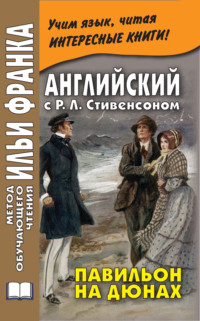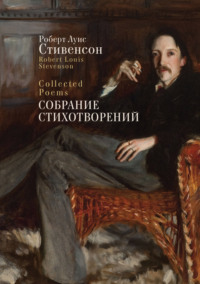 полная версия
полная версияIn the South Seas
I had occasion to see much of this excellent man. He sailed with us from Tai-o-hae to Hiva-oa, a dead beat of ninety miles against a heavy sea. It was what is called a good passage, and a feather in the Casco’s cap; but among the most miserable forty hours that any one of us had ever passed. We were swung and tossed together all that time like shot in a stage thunder-box. The mate was thrown down and had his head cut open; the captain was sick on deck; the cook sick in the galley. Of all our party only two sat down to dinner. I was one. I own that I felt wretchedly; and I can only say of the other, who professed to feel quite well, that she fled at an early moment from the table. It was in these circumstances that we skirted the windward shore of that indescribable island of Ua-pu; viewing with dizzy eyes the coves, the capes, the breakers, the climbing forests, and the inaccessible stone needles that surmount the mountains. The place persists, in a dark corner of our memories, like a piece of the scenery of nightmares. The end of this distressful passage, where we were to land our passengers, was in a similar vein of roughness. The surf ran high on the beach at Taahauku; the boat broached-to and capsized; and all hands were submerged. Only the brother himself, who was well used to the experience, skipped ashore, by some miracle of agility, with scarce a sprinkling. Thenceforward, during our stay at Hiva-oa, he was our cicerone and patron; introducing us, taking us excursions, serving us in every way, and making himself daily more beloved.
Michel Blanc had been a carpenter by trade; had made money and retired, supposing his active days quite over; and it was only when he found idleness dangerous that he placed his capital and acquirements at the service of the mission. He became their carpenter, mason, architect, and engineer; added sculpture to his accomplishments, and was famous for his skill in gardening. He wore an enviable air of having found a port from life’s contentions and lying there strongly anchored; went about his business with a jolly simplicity; complained of no lack of results – perhaps shyly thinking his own statuary result enough; and was altogether a pattern of the missionary layman.
CHAPTER VIII – THE PORT OF ENTRY
The port – the mart, the civil and religious capital of these rude islands – is called Tai-o-hae, and lies strung along the beach of a precipitous green bay in Nuka-hiva. It was midwinter when we came thither, and the weather was sultry, boisterous, and inconstant. Now the wind blew squally from the land down gaps of splintered precipice; now, between the sentinel islets of the entry, it came in gusts from seaward. Heavy and dark clouds impended on the summits; the rain roared and ceased; the scuppers of the mountain gushed; and the next day we would see the sides of the amphitheatre bearded with white falls. Along the beach the town shows a thin file of houses, mostly white, and all ensconced in the foliage of an avenue of green puraos; a pier gives access from the sea across the belt of breakers; to the eastward there stands, on a projecting bushy hill, the old fort which is now the calaboose, or prison; eastward still, alone in a garden, the Residency flies the colours of France. Just off Calaboose Hill, the tiny Government schooner rides almost permanently at anchor, marks eight bells in the morning (there or thereabout) with the unfurling of her flag, and salutes the setting sun with the report of a musket.
Here dwell together, and share the comforts of a club (which may be enumerated as a billiard-board, absinthe, a map of the world on Mercator’s projection, and one of the most agreeable verandahs in the tropics), a handful of whites of varying nationality, mostly French officials, German and Scottish merchant clerks, and the agents of the opium monopoly. There are besides three tavern-keepers, the shrewd Scot who runs the cotton gin-mill, two white ladies, and a sprinkling of people ‘on the beach’ – a South Sea expression for which there is no exact equivalent. It is a pleasant society, and a hospitable. But one man, who was often to be seen seated on the logs at the pier-head, merits a word for the singularity of his history and appearance. Long ago, it seems, he fell in love with a native lady, a High Chiefess in Ua-pu. She, on being approached, declared she could never marry a man who was untattooed; it looked so naked; whereupon, with some greatness of soul, our hero put himself in the hands of the Tahukus, and, with still greater, persevered until the process was complete. He had certainly to bear a great expense, for the Tahuku will not work without reward; and certainly exquisite pain. Kooamua, high chief as he was, and one of the old school, was only part tattooed; he could not, he told us with lively pantomime, endure the torture to an end. Our enamoured countryman was more resolved; he was tattooed from head to foot in the most approved methods of the art; and at last presented himself before his mistress a new man. The fickle fair one could never behold him from that day except with laughter. For my part, I could never see the man without a kind of admiration; of him it might be said, if ever of any, that he had loved not wisely, but too well.
The Residency stands by itself, Calaboose Hill screening it from the fringe of town along the further bay. The house is commodious, with wide verandahs; all day it stands open, back and front, and the trade blows copiously over its bare floors. On a week-day the garden offers a scene of most untropical animation, half a dozen convicts toiling there cheerfully with spade and barrow, and touching hats and smiling to the visitor like old attached family servants. On Sunday these are gone, and nothing to be seen but dogs of all ranks and sizes peacefully slumbering in the shady grounds; for the dogs of Tai-o-hae are very courtly-minded, and make the seat of Government their promenade and place of siesta. In front and beyond, a strip of green down loses itself in a low wood of many species of acacia; and deep in the wood a ruinous wall encloses the cemetery of the Europeans. English and Scottish sleep there, and Scandinavians, and French maîtres de manœuvres and maîtres ouvriers: mingling alien dust. Back in the woods, perhaps, the blackbird, or (as they call him there) the island nightingale, will be singing home strains; and the ceaseless requiem of the surf hangs on the ear. I have never seen a resting-place more quiet; but it was a long thought how far these sleepers had all travelled, and from what diverse homes they had set forth, to lie here in the end together.
On the summit of its promontory hill, the calaboose stands all day with doors and window-shutters open to the trade. On my first visit a dog was the only guardian visible. He, indeed, rose with an attitude so menacing that I was glad to lay hands on an old barrel-hoop; and I think the weapon must have been familiar, for the champion instantly retreated, and as I wandered round the court and through the building, I could see him, with a couple of companions, humbly dodging me about the corners. The prisoners’ dormitory was a spacious, airy room, devoid of any furniture; its whitewashed walls covered with inscriptions in Marquesan and rude drawings: one of the pier, not badly done; one of a murder; several of French soldiers in uniform. There was one legend in French: ‘Je n’est’ (sic) ‘pas le sou.’ From this noontide quietude it must not be supposed the prison was untenanted; the calaboose at Tai-o-hae does a good business. But some of its occupants were gardening at the Residency, and the rest were probably at work upon the streets, as free as our scavengers at home, although not so industrious. On the approach of evening they would be called in like children from play; and the harbour-master (who is also the jailer) would go through the form of locking them up until six the next morning. Should a prisoner have any call in town, whether of pleasure or affairs, he has but to unhook the window-shutters; and if he is back again, and the shutter decently replaced, by the hour of call on the morrow, he may have met the harbour-master in the avenue, and there will be no complaint, far less any punishment. But this is not all. The charming French Resident, M. Delaruelle, carried me one day to the calaboose on an official visit. In the green court, a very ragged gentleman, his legs deformed with the island elephantiasis, saluted us smiling. ‘One of our political prisoners – an insurgent from Raiatea,’ said the Resident; and then to the jailer: ‘I thought I had ordered him a new pair of trousers.’ Meanwhile no other convict was to be seen – ‘Eh bien,’ said the Resident, ‘où sont vos prisonniers?’ ‘Monsieur le Résident,’ replied the jailer, saluting with soldierly formality, ‘comme c’est jour de fête, je les ai laissé aller à la chasse.’ They were all upon the mountains hunting goats! Presently we came to the quarters of the women, likewise deserted – ‘Où sont vos bonnes femmes?’ asked the Resident; and the jailer cheerfully responded: ‘Je crois, Monsieur le Résident, qu’elles sont allées quelquepart faire une visite.’ It had been the design of M. Delaruelle, who was much in love with the whimsicalities of his small realm, to elicit something comical; but not even he expected anything so perfect as the last. To complete the picture of convict life in Tai-o-hae, it remains to be added that these criminals draw a salary as regularly as the President of the Republic. Ten sous a day is their hire. Thus they have money, food, shelter, clothing, and, I was about to write, their liberty. The French are certainly a good-natured people, and make easy masters. They are besides inclined to view the Marquesans with an eye of humorous indulgence. ‘They are dying, poor devils!’ said M. Delaruelle: ‘the main thing is to let them die in peace.’ And it was not only well said, but I believe expressed the general thought. Yet there is another element to be considered; for these convicts are not merely useful, they are almost essential to the French existence. With a people incurably idle, dispirited by what can only be called endemic pestilence, and inflamed with ill-feeling against their new masters, crime and convict labour are a godsend to the Government.
Theft is practically the sole crime. Originally petty pilferers, the men of Tai-o-hae now begin to force locks and attack strong-boxes. Hundreds of dollars have been taken at a time; though, with that redeeming moderation so common in Polynesian theft, the Marquesan burglar will always take a part and leave a part, sharing (so to speak) with the proprietor. If it be Chilian coin – the island currency – he will escape; if the sum is in gold, French silver, or bank-notes, the police wait until the money begins to come in circulation, and then easily pick out their man. And now comes the shameful part. In plain English, the prisoner is tortured until he confesses and (if that be possible) restores the money. To keep him alone, day and night, in the black hole, is to inflict on the Marquesan torture inexpressible. Even his robberies are carried on in the plain daylight, under the open sky, with the stimulus of enterprise, and the countenance of an accomplice; his terror of the dark is still insurmountable; conceive, then, what he endures in his solitary dungeon; conceive how he longs to confess, become a full-fledged convict, and be allowed to sleep beside his comrades. While we were in Tai-o-hae a thief was under prevention. He had entered a house about eight in the morning, forced a trunk, and stolen eleven hundred francs; and now, under the horrors of darkness, solitude, and a bedevilled cannibal imagination, he was reluctantly confessing and giving up his spoil. From one cache, which he had already pointed out, three hundred francs had been recovered, and it was expected that he would presently disgorge the rest. This would be ugly enough if it were all; but I am bound to say, because it is a matter the French should set at rest, that worse is continually hinted. I heard that one man was kept six days with his arms bound backward round a barrel; and it is the universal report that every gendarme in the South Seas is equipped with something in the nature of a thumbscrew. I do not know this. I never had the face to ask any of the gendarmes – pleasant, intelligent, and kindly fellows – with whom I have been intimate, and whose hospitality I have enjoyed; and perhaps the tale reposes (as I hope it does) on a misconstruction of that ingenious cat’s-cradle with which the French agent of police so readily secures a prisoner. But whether physical or moral, torture is certainly employed; and by a barbarous injustice, the state of accusation (in which a man may very well be innocently placed) is positively painful; the state of conviction (in which all are supposed guilty) is comparatively free, and positively pleasant. Perhaps worse still, – not only the accused, but sometimes his wife, his mistress, or his friend, is subjected to the same hardships. I was admiring, in the tapu system, the ingenuity of native methods of detection; there is not much to admire in those of the French, and to lock up a timid child in a dark room, and, if he proved obstinate, lock up his sister in the next, is neither novel nor humane.
The main occasion of these thefts is the new vice of opium-eating. ‘Here nobody ever works, and all eat opium,’ said a gendarme; and Ah Fu knew a woman who ate a dollar’s worth in a day. The successful thief will give a handful of money to each of his friends, a dress to a woman, pass an evening in one of the taverns of Tai-o-hae, during which he treats all comers, produce a big lump of opium, and retire to the bush to eat and sleep it off. A trader, who did not sell opium, confessed to me that he was at his wit’s end. ‘I do not sell it, but others do,’ said he. ‘The natives only work to buy it; if they walk over to me to sell their cotton, they have just to walk over to some one else to buy their opium with my money. And why should they be at the bother of two walks? There is no use talking,’ he added – ‘opium is the currency of this country.’
The man under prevention during my stay at Tai-o-hae lost patience while the Chinese opium-seller was being examined in his presence. ‘Of course he sold me opium!’ he broke out; ‘all the Chinese here sell opium. It was only to buy opium that I stole; it is only to buy opium that anybody steals. And what you ought to do is to let no opium come here, and no Chinamen.’ This is precisely what is done in Samoa by a native Government; but the French have bound their own hands, and for forty thousand francs sold native subjects to crime and death. This horrid traffic may be said to have sprung up by accident. It was Captain Hart who had the misfortune to be the means of beginning it, at a time when his plantations flourished in the Marquesas, and he found a difficulty in keeping Chinese coolies. To-day the plantations are practically deserted and the Chinese gone; but in the meanwhile the natives have learned the vice, the patent brings in a round sum, and the needy Government at Papeete shut their eyes and open their pockets. Of course, the patentee is supposed to sell to Chinamen alone; equally of course, no one could afford to pay forty thousand francs for the privilege of supplying a scattered handful of Chinese; and every one knows the truth, and all are ashamed of it. French officials shake their heads when opium is mentioned; and the agents of the farmer blush for their employment. Those that live in glass houses should not throw stones; as a subject of the British crown, I am an unwilling shareholder in the largest opium business under heaven. But the British case is highly complicated; it implies the livelihood of millions; and must be reformed, when it can be reformed at all, with prudence. This French business, on the other hand, is a nostrum and a mere excrescence. No native industry was to be encouraged: the poison is solemnly imported. No native habit was to be considered: the vice has been gratuitously introduced. And no creature profits, save the Government at Papeete – the not very enviable gentlemen who pay them, and the Chinese underlings who do the dirty work.
CHAPTER IX – THE HOUSE OF TEMOANA
The history of the Marquesas is, of late years, much confused by the coming and going of the French. At least twice they have seized the archipelago, at least once deserted it; and in the meanwhile the natives pursued almost without interruption their desultory cannibal wars. Through these events and changing dynasties, a single considerable figure may be seen to move: that of the high chief, a king, Temoana. Odds and ends of his history came to my ears: how he was at first a convert to the Protestant mission; how he was kidnapped or exiled from his native land, served as cook aboard a whaler, and was shown, for small charge, in English seaports; how he returned at last to the Marquesas, fell under the strong and benign influence of the late bishop, extended his influence in the group, was for a while joint ruler with the prelate, and died at last the chief supporter of Catholicism and the French. His widow remains in receipt of two pounds a month from the French Government. Queen she is usually called, but in the official almanac she figures as ‘Madame Vaekehu, Grande Chefesse.’ His son (natural or adoptive, I know not which), Stanislao Moanatini, chief of Akaui, serves in Tai-o-hae as a kind of Minister of Public Works; and the daughter of Stanislao is High Chiefess of the southern island of Tauata. These, then, are the greatest folk of the archipelago; we thought them also the most estimable. This is the rule in Polynesia, with few exceptions; the higher the family, the better the man – better in sense, better in manners, and usually taller and stronger in body. A stranger advances blindfold. He scrapes acquaintance as he can. Save the tattoo in the Marquesas, nothing indicates the difference of rank; and yet almost invariably we found, after we had made them, that our friends were persons of station. I have said ‘usually taller and stronger.’ I might have been more absolute, – over all Polynesia, and a part of Micronesia, the rule holds good; the great ones of the isle, and even of the village, are greater of bone and muscle, and often heavier of flesh, than any commoner. The usual explanation – that the high-born child is more industriously shampooed, is probably the true one. In New Caledonia, at least, where the difference does not exist, has never been remarked, the practice of shampooing seems to be itself unknown. Doctors would be well employed in a study of the point.
Vaekehu lives at the other end of the town from the Residency, beyond the buildings of the mission. Her house is on the European plan: a table in the midst of the chief room; photographs and religious pictures on the wall. It commands to either hand a charming vista: through the front door, a peep of green lawn, scurrying pigs, the pendent fans of the coco-palm and splendour of the bursting surf: through the back, mounting forest glades and coronals of precipice. Here, in the strong thorough-draught, Her Majesty received us in a simple gown of print, and with no mark of royalty but the exquisite finish of her tattooed mittens, the elaboration of her manners, and the gentle falsetto in which all the highly refined among Marquesan ladies (and Vaekehu above all others) delight to sing their language. An adopted daughter interpreted, while we gave the news, and rehearsed by name our friends of Anaho. As we talked, we could see, through the landward door, another lady of the household at her toilet under the green trees; who presently, when her hair was arranged, and her hat wreathed with flowers, appeared upon the back verandah with gracious salutations.
Vaekehu is very deaf; ‘merci’ is her only word of French; and I do not know that she seemed clever. An exquisite, kind refinement, with a shade of quietism, gathered perhaps from the nuns, was what chiefly struck us. Or rather, upon that first occasion, we were conscious of a sense as of district-visiting on our part, and reduced evangelical gentility on the part of our hostess. The other impression followed after she was more at ease, and came with Stanislao and his little girl to dine on board the Casco. She had dressed for the occasion: wore white, which very well became her strong brown face; and sat among us, eating or smoking her cigarette, quite cut off from all society, or only now and then included through the intermediary of her son. It was a position that might have been ridiculous, and she made it ornamental; making believe to hear and to be entertained; her face, whenever she met our eyes, lighting with the smile of good society; her contributions to the talk, when she made any, and that was seldom, always complimentary and pleasing. No attention was paid to the child, for instance, but what she remarked and thanked us for. Her parting with each, when she came to leave, was gracious and pretty, as had been every step of her behaviour. When Mrs. Stevenson held out her hand to say good-bye, Vaekehu took it, held it, and a moment smiled upon her; dropped it, and then, as upon a kindly after-thought, and with a sort of warmth of condescension, held out both hands and kissed my wife upon both cheeks. Given the same relation of years and of rank, the thing would have been so done on the boards of the Comédie Française; just so might Madame Brohan have warmed and condescended to Madame Broisat in the Marquis de Villemer. It was my part to accompany our guests ashore: when I kissed the little girl good-bye at the pier steps, Vaekehu gave a cry of gratification, reached down her hand into the boat, took mine, and pressed it with that flattering softness which seems the coquetry of the old lady in every quarter of the earth. The next moment she had taken Stanislao’s arm, and they moved off along the pier in the moonlight, leaving me bewildered. This was a queen of cannibals; she was tattooed from hand to foot, and perhaps the greatest masterpiece of that art now extant, so that a while ago, before she was grown prim, her leg was one of the sights of Tai-o-hae; she had been passed from chief to chief; she had been fought for and taken in war; perhaps, being so great a lady, she had sat on the high place, and throned it there, alone of her sex, while the drums were going twenty strong and the priests carried up the blood-stained baskets of long-pig. And now behold her, out of that past of violence and sickening feasts, step forth, in her age, a quiet, smooth, elaborate old lady, such as you might find at home (mittened also, but not often so well-mannered) in a score of country houses. Only Vaekehu’s mittens were of dye, not of silk; and they had been paid for, not in money, but the cooked flesh of men. It came in my mind with a clap, what she could think of it herself, and whether at heart, perhaps, she might not regret and aspire after the barbarous and stirring past. But when I asked Stanislao – ‘Ah!’ said he, ‘she is content; she is religious, she passes all her days with the sisters.’
Stanislao (Stanislaos, with the final consonant evaded after the Polynesian habit) was sent by Bishop Dordillon to South America, and there educated by the fathers. His French is fluent, his talk sensible and spirited, and in his capacity of ganger-in-chief, he is of excellent service to the French. With the prestige of his name and family, and with the stick when needful, he keeps the natives working and the roads passable. Without Stanislao and the convicts, I am in doubt what would become of the present regimen in Nuka-hiva; whether the highways might not be suffered to close up, the pier to wash away, and the Residency to fall piecemeal about the ears of impotent officials. And yet though the hereditary favourer, and one of the chief props of French authority, he has always an eye upon the past. He showed me where the old public place had stood, still to be traced by random piles of stone; told me how great and fine it was, and surrounded on all sides by populous houses, whence, at the beating of the drums, the folk crowded to make holiday. The drum-beat of the Polynesian has a strange and gloomy stimulation for the nerves of all. White persons feel it – at these precipitate sounds their hearts beat faster; and, according to old residents, its effect on the natives was extreme. Bishop Dordillon might entreat; Temoana himself command and threaten; at the note of the drum wild instincts triumphed. And now it might beat upon these ruins, and who should assemble? The houses are down, the people dead, their lineage extinct; and the sweepings and fugitives of distant bays and islands encamp upon their graves. The decline of the dance Stanislao especially laments. ‘Chaque pays a ses coutumes,’ said he; but in the report of any gendarme, perhaps corruptly eager to increase the number of délits and the instruments of his own power, custom after custom is placed on the expurgatorial index. ‘Tenez, une danse qui n’est pas permise,’ said Stanislao: ‘je ne sais pas pourquoi, elle est très jolie, elle va comme ça,’ and sticking his umbrella upright in the road, he sketched the steps and gestures. All his criticisms of the present, all his regrets for the past, struck me as temperate and sensible. The short term of office of the Resident he thought the chief defect of the administration; that officer having scarce begun to be efficient ere he was recalled. I thought I gathered, too, that he regarded with some fear the coming change from a naval to a civil governor. I am sure at least that I regard it so myself; for the civil servants of France have never appeared to any foreigner as at all the flower of their country, while her naval officers may challenge competition with the world. In all his talk, Stanislao was particular to speak of his own country as a land of savages; and when he stated an opinion of his own, it was with some apologetic preface, alleging that he was ‘a savage who had travelled.’ There was a deal, in this elaborate modesty, of honest pride. Yet there was something in the precaution that saddened me; and I could not but fear he was only forestalling a taunt that he had heard too often.









